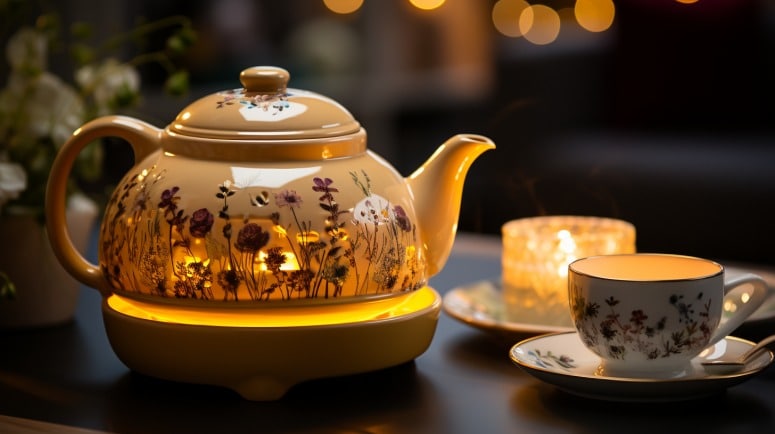Hey there, fellow tea enthusiasts! If you’re anything like me, you simply adore exploring new and exciting flavors in the world of tea. Well, folks, have I got a treat for you! You see, not too long ago, I stumbled upon the captivating world of rooibos chai tea, and boy, am I hooked! Now, what’s so special about this tea, you ask?
Rooibos chai tea is a caffeine-free, delicious blend that offers a rich variety of flavors and countless health benefits. I’ve tried countless teas, but this rooibos chai stands out among the crowd. So, if you’re ready to dive into this magical tea experience, buckle up, because I’m about to take you on a fantastic journey.
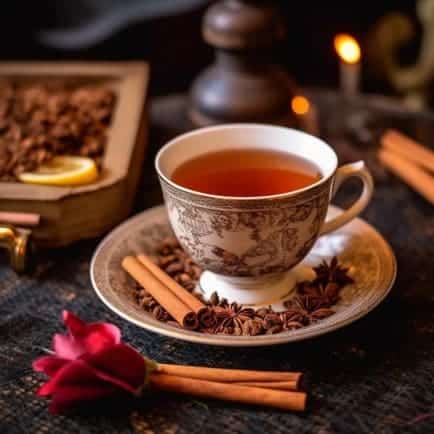
Table of Contents
Rooibos Chai Tea – A Deeper Look into Its Origins, Ingredients, and Characteristics
Rooibos chai tea is an infusion made from the leaves of the rooibos plant, also known as Aspalathus linearis, and a harmonious blend of traditional chai spices. The term “chai” itself means “tea” in various languages; however, in the context of rooibos chai, it refers to the classic blend of Indian spices known as “masala chai.”
Origin of the Tea
Rooibos tea comes from the unfrequented Cederberg region of South Africa, where the indigenous rooibos plant grows wild. The plant’s needle-like leaves are harvested, bruised, and left in the sun to oxidize—a process that yields the deep-red rooibos tea we know and love.
Rooibos chai tea is the union of these unique, naturally caffeine-free South African tea leaves with the celebrated chai spices of Indian origin. This fusion creates a brew offering a distinct yet delightful flavor experience for tea enthusiasts worldwide.

Main Ingredients: Rooibos Leaves & Chai Spices
To fully appreciate the depth and complexity of rooibos chai tea, let’s delve into the integral components of its bouquet of flavors:
Rooibos tea leaves: The caffeine-free rooibos leaves give the tea a unique, earthy, and natural sweetness, accentuated by hints of vanilla. This South African tea is celebrated both for its flavors and its numerous health benefits.
Organic ginger: Ginger brings warmth and spice to rooibos chai tea, invigorating your senses with its mildly fiery kick. Ginger’s digestive benefits, along with its anti-inflammatory and antioxidant properties, contribute to the tea’s health-enhancing characteristics.
Organic cinnamon: Cinnamon, a familiar and beloved spice, adds natural sweetness and warmth to the tea, deepening its flavors. It also boasts numerous health benefits, including antioxidant, anti-inflammatory, and blood sugar regulation properties.
Organic cardamom: Known for its cooling and aromatic properties, cardamom contributes a slightly sweet, citrusy note to the tea. It is a digestive aid and offers various health advantages like antioxidant, anti-inflammatory, and diuretic effects.
Organic cloves: These aromatic, dried flower buds contribute a warm, sweet, and slightly bitter taste to rooibos chai tea. Cloves have antimicrobial and anti-inflammatory properties, as well as the potential to aid digestion.
Organic allspice: True to its name, allspice imparts a flavor reminiscent of a blend of multiple warm spices like cloves, cinnamon, and nutmeg. This spice boosts rooibos chai tea’s flavor profile and offers its own antioxidant and anti-inflammatory benefits.
Organic nutmeg: Nutmeg adds a subtle, slightly sweet, and nutty undertone to the rooibos chai tea. This warm spice has long been used in traditional medicine, helping with digestion and possessing anti-inflammatory qualities.
In essence, rooibos chai tea is a delicious combination of a unique caffeine-free tea base and a warm, fragrant array of spices. Although paying homage to its masala chai roots, rooibos chai tea stands apart as a cultural fusion, creating its unique category of flavors and experiences.
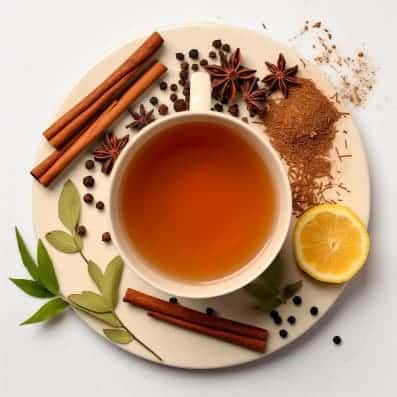
Rooibos Chai Tea vs. Traditional Chai Tea
Now that we know what rooibos chai tea is, let’s compare it to the well-known traditional chai tea:
Ingredient differences: The main difference between rooibos chai tea and traditional chai tea lies in their ingredients. While rooibos chai tea is made using rooibos tea leaves from South Africa, traditional chai tea typically consists of black tea leaves blended with Indian spices like cinnamon, cardamom, cloves, and ginger.
Caffeine content: One of the most significant differences between these two teas is their caffeine content. Rooibos chai tea is naturally caffeine-free, making it an excellent option for individuals who are sensitive to caffeine, or those who simply want to enjoy a delicious cup of tea without the stimulating effects of caffeine.
In contrast, traditional chai tea contains caffeine due to the black tea leaves used in the blend. Overall, both rooibos chai tea and traditional chai tea have their unique charms. The choice between the two often boils down to personal preference and tolerance for caffeine.

Health Benefits of Rooibos Chai Tea
You’re not only indulging in a delightful beverage when you sip on rooibos chai tea. You’re also reaping a multitude of health benefits. Here are some of the incredible advantages of including this tea in your daily routine:
Antioxidant properties: Rooibos tea is packed with antioxidants, which are known for their ability to protect our bodies against harmful free radicals.
Caffeine-free: As previously mentioned, rooibos chai tea is naturally caffeine-free, making it an ideal choice for anyone avoiding stimulants.
Digestive health: The spices found in rooibos chai tea, such as ginger and cinnamon, have long been known to support healthy digestion.
Stress relief: The soothing blend of rooibos chai tea can help relieve stress and anxiety, providing a calming effect on both the mind and body.
Heart health: Rooibos tea has been linked with improved heart health, potentially reducing the risk of cardiovascular diseases.
Of course, always consult your healthcare provider before making significant changes to your diet or using natural remedies for specific health concerns.
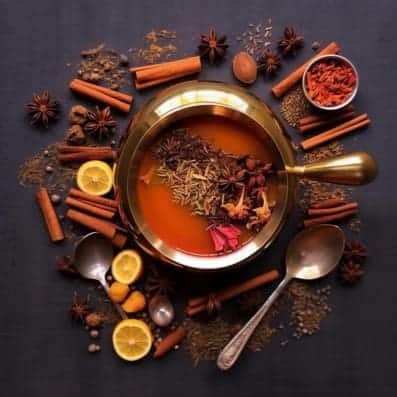
The Joy of Brewing Rooibos Chai Tea: Ingredients and Brewing Instructions
Now that we’ve explored the benefits of rooibos chai tea, it’s time to learn how to make a perfect cup. Follow these simple steps for a delightful tea experience:
Gather ingredients: When brewing a cup of rooibos chai tea, it’s essential to have high-quality ingredients at hand. Ensure you have fresh rooibos chai tea leaves or tea bags and purified water for a divine taste. You can also gather additional ingredients like milk, honey, or maple syrup, to customize your cup of tea.
Boil water: Bring filtered water to a rolling boil, ideally at around 212 degrees Fahrenheit (100 degrees Celsius).
Steep tea: Measure 1-1.5 teaspoons of loose rooibos chai tea (or 1 tea bag) into a teacup or teapot. Pour 8 ounces (240 mL) of the boiling water over the tea leaves or bag, and let it steep for 5-7 minutes. The longer the steeping time, the stronger the flavor.
Add sweeteners and milk (optional): If desired, add honey, maple syrup, or your preferred sweetener to taste. It is also common to add milk or a milk alternative, such as almond or soy milk, to create a creamier texture.
Enjoy: Savor the delightful flavors of your freshly brewed rooibos chai tea.

Tasting Organic Tea: Exploring the Flavors of Rooibos Chai
While sipping on your freshly brewed cup of rooibos chai tea, take a moment to appreciate the symphony of flavors it offers:
Earthy vanilla taste: Rooibos tea is known for its distinct, earthy vanilla flavor. The combination of warm spices and rooibos creates a comforting and soothing taste.
Organic ginger: Ginger brings a warm and mildly spicy kick to the blend, elevating the overall flavor.
Organic cinnamon: The subtle sweetness of cinnamon adds depth and warmth, making this tea uniquely delightful.
Organic cardamom: Cardamom imparts a slightly sweet, aromatic, and citrusy flavor, adding a touch of complexity to the tea.
…and more: Additional spices like cloves, allspice, and nutmeg contribute to the overall rich and satisfying flavor profile of rooibos chai tea.
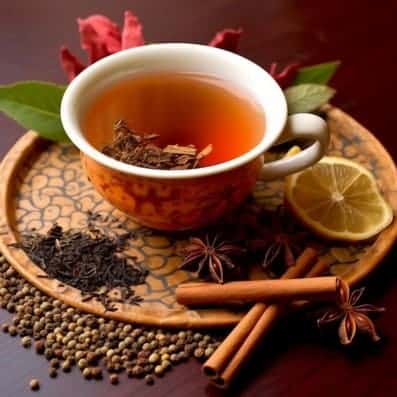
The Art of Pairing Rooibos Chai Tea with Food
Rooibos chai tea’s delightful medley of flavors lends itself well to food pairings. Enhance your enjoyment of this delectable tea by exploring the culinary world with these recommended food pairings:
Spiced desserts
Rooibos chai tea’s warm, spiced character makes it an ideal match for desserts flavored with complementary spices such as cinnamon, nutmeg, and allspice. Treat yourself to a slice of apple pie, gingerbread, or cinnamon-spiced cookies while sipping on your freshly brewed cup.
Chocolate treats
When it comes to indulgent desserts, few things compare to the joy of savoring rich, chocolate flavors alongside a cup of rooibos chai tea. The natural sweetness of the tea brings out the cacao notes, creating a harmonious experience. Sample chocolate cake, truffles, or brownies for a truly decadent treat.
Indian cuisine
The spices in rooibos chai tea beautifully complement the flavors of Indian dishes. Pair your tea with vegetable or chicken curries, pakoras, or samosas to amplify the multidimensional flavor profiles.

Cheese platters
For a refined pairing, consider enjoying rooibos chai tea with a carefully curated cheese platter. The tea’s aromatic spices and earthy notes work well with both hard and soft cheeses. Be adventurous and choose cheeses with distinct flavors, like gouda, camembert, or a bold blue cheese.
Brunch favorites
Rooibos chai tea is perfect alongside classic brunch dishes. The tea pairs beautifully with quiches, French toasts, and fruit salads, offering a refreshing and flavorful accompaniment to your favorite brunch-time fare.
By consciously pairing your rooibos chai tea with complementary dishes, you’ll elevate your entire tea-drinking experience, creating a truly memorable sensorial journey.
The Perfect After-Dinner Treat: Rooibos Chai Tea Recipes and Serving Suggestions
Now that we’ve covered the basics of rooibos chai tea and its ethical considerations, let’s explore a few delicious ways to enjoy this wonderful beverage:
Rooibos chai latte: Start by brewing a strong cup of rooibos chai tea. Then, steam or froth your choice of milk or milk alternative. Pour the frothed milk into the brewed tea, and add honey or maple syrup for a touch of sweetness.
Iced rooibos chai tea: Brew your rooibos chai tea and let it cool to room temperature. Fill a glass with ice, pour the tea over the ice, and stir in your preferred sweetener. To enhance the flavor, you can also add a splash of milk or a milk alternative.
Rooibos chai with maple syrup: Brew your rooibos chai tea and simply add a generous drizzle of maple syrup for a delectable, all-natural sweetness. Enjoy these versatile recipes and serving suggestions any time you fancy a delightful cup of rooibos chai tea.
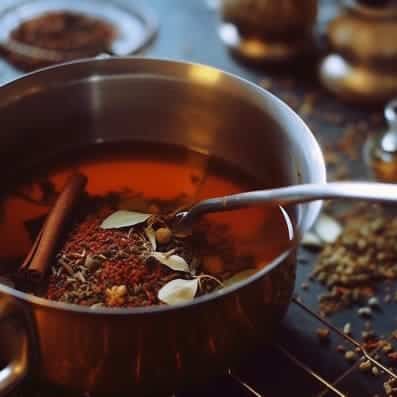
Fair Trade Practices and Organic Farming
The tea industry has its fair share of ethical and environmental concerns. As responsible tea lovers, choosing brands that prioritize fair trade practices and organic farming is essential. Let’s see why:
Fair trade practices: These practices ensure that tea farmers and laborers receive fair wages, work in humane conditions, and invest in their local communities. Supporting fair trade rooibos chai tea helps to promote a sustainable and ethical tea industry.
Importance of organic farming: Organic farming reduces the use of synthetic pesticides and fertilizers, benefiting our environment and health. When you choose organic rooibos chai tea, you’re choosing a cleaner and eco-friendlier product.
Sustainability: Fair trade and organic farming both contribute to a sustainable tea industry, where both the environment and people working in the tea fields thrive. Next time you shop for rooibos chai tea, look for brands that are certified organic and fair trade to make a conscious and responsible choice.

Exploring Unique Rooibos Chai Tea Blends
While the traditional rooibos chai tea includes classic spices like cinnamon, cardamom, and cloves, innovative tea artisans have crafted unique twists on your soon-to-be favorite tea. Here are a few unique rooibos chai blends that are worth a taste:
Chocolate Rooibos Chai
Indulge your senses by adding chocolate to your chai. Imagine the same comforting aromas of chai spices complemented by the rich and velvety flavors of cacao. The addition of cacao nibs or chocolate chips creates a dessert-like tea that’s perfect for special occasions or to satisfy your sweet tooth.
Tulsi Rooibos Chai
By combining Tulsi (holy basil) with rooibos chai, you’ll experience an incredible union of calming effects and delicious spices. Tulsi is an adaptogenic herb highly regarded in Ayurvedic medicine, praised for its ability to reduce stress and promote relaxation. This blend is perfect for unwinding after a long day or when you need a moment of tranquility.
Vanilla Rooibos Chai
Amp up the natural vanilla flavors of rooibos by adding pure vanilla extracts or vanilla beans into the mix. The result? A soothing, creamy cup of tea that feels like a warm hug on a chilly day.
Pumpkin Spice Rooibos Chai
Infuse your chai with the warming, seasonal flavors of autumn. Adding pumpkin pie spice and a hint of real pumpkin puree will transform your rooibos chai into a festive treat that pairs perfectly with crisp fall afternoons and cozy sweaters.
As you can see, the world of rooibos chai tea is vast and full of exciting combinations. Embrace your adventurous spirit and try some of these delightful variations, or even create your own unique blend tailored to your taste preferences!

Adding Rooibos Chai Tea to Your Tea Collection
As a tea lover, you’ll want to ensure that you’re selecting the best rooibos chai tea for your collection. Here’s what to keep in mind when purchasing and storing your tea:
Selecting quality blends: Look for companies that source their rooibos tea and spices ethically, and opt for an organic rooibos chai blend whenever possible. By selecting high-quality, sustainably produced teas, you’re supporting both your health and the environment.
Where to purchase: You can find rooibos chai tea in various stores such as specialty tea shops, health food stores, or online retailers. Be sure to check the product label for certifications like organic and fair-trade to make an informed decision.
Proper storage: To preserve the flavor and freshness of your rooibos chai tea, store it in an airtight container, away from direct sunlight and humidity. Placing the container in a cool and dark area, such as a cabinet or pantry, will further enhance its shelf life.

Important Considerations When Drinking Rooibos Chai Tea
While rooibos chai tea offers a wide array of health benefits and is generally suitable for most people, it’s essential to consider some factors when incorporating it into your daily routine. Here are some important points to ponder:
When to drink it: Given its caffeine-free nature, rooibos chai tea can be enjoyed at any time of the day. It’s particularly fitting as an after-dinner treat or as a soothing beverage before bedtime.
Consumption guidelines: While there aren’t any strict drinking guidelines in place for rooibos chai tea, moderation is always a prudent approach. It’s generally safe to drink multiple cups a day, but pay attention to how your body reacts. If you experience any discomfort or sensitivities to the spices in the tea, it’s best to cut back on your intake.
Safety for all ages: Rooibos chai tea is considered safe for people of all ages, including children and pregnant or nursing women. Its caffeine-free nature and numerous health benefits make it a suitable beverage option for most. However, if you have specific health concerns or experience adverse reactions, consult your healthcare provider before continuing to consume rooibos chai tea.
Allergies and sensitivities: Some individuals may be allergic or sensitive to certain ingredients in rooibos chai tea, such as the spices or herbs used in the blend. If you have a history of allergies or sensitivities, pay close attention to the ingredients before indulging in a cup of tea. Should you experience any adverse reactions, stop drinking the tea and consult a medical professional.
By keeping these considerations in mind, you can safely enjoy the multitude of benefits that rooibos chai tea offers while ensuring a pleasant and wholesome experience.

Conclusion
In this article, we have journeyed through the captivating world of fair labor organic rooibos chai teas. We have explored their origins in the rich Cedarburg Mountains and the warm traditions that infuse mellow rooibos with exotic Indian spices. We have delved into the importance of supporting fair-trade certified gardens and indulged in the delightful red tea’s delicious taste, made even more enchanting by the highest quality organic cardamom sourced from fair labor gardens.
These caffeine-free chai teas encompass a sultry blend of natural flavors, thanks to the vivacious ginger, sweet cinnamon, and piquant cloves that mingle masterfully with mellow rooibos. Savored as iced tea or enjoyed with warm milk, rooibos chai offers a sweet release from everyday stresses, inviting you into a world of vibrant taste experiences and unique blends. By choosing rooibos chai tea from fair trade sales and fair labor gardens, we support gender equality, contribute to local schools in Central America, and promote sustainable production practices, ultimately ensuring a brighter future for producers and ecological preservation.
As we have seen, rooibos chai tea is more than a beverage—it’s a celebration of cultures, dedication to ethical practices, and a diverse array of palate pleasures. So sit back, pour hot water over your blend of warming spices, and let the enchanting allure of organic rooibos chai tea transport you to a world where flavor, tradition, and sustainability intertwine harmoniously.
What makes rooibos chai tea a healthy beverage choice?
Rooibos chai tea offers an array of health benefits, making it an excellent beverage choice for those conscious about their well-being. A naturally caffeine-free option, rooibos tea is packed with antioxidants that protect the body against harmful free radicals. The blend of warming spices, like ginger, cinnamon, and cloves, adds health-enhancing properties such as aiding digestion, reducing inflammation, and promoting relaxation. This unique fusion allows rooibos chai tea to cater to individuals looking for a tasty and nourishing drink without the stimulating effects of caffeine.
Can rooibos chai tea be served both hot and cold?
Yes, rooibos chai is a versatile beverage that can be enjoyed hot or cold. To enjoy it hot, simply brew the tea using boiling water and steep for 5-7 minutes. For a satisfying iced tea, brew the tea as usual, let it cool to room temperature, and then pour over ice. In either form, you can add sweeteners like honey or maple syrup, a splash of milk, or milk alternatives to further enhance the taste and create a customized beverage to satisfy your taste preferences.
Why is it important to purchase rooibos chai tea from fair trade and organic sources?
Purchasing rooibos chai from fair trade and organic sources ensures that you are supporting ethical and sustainable practices. Fair trade prioritizes fair wages, humane working conditions, and environmentally responsible farming techniques. Organic farming seeks to reduce the use of synthetic pesticides and fertilizers, fostering a healthier environment and cleaner tea leaves. By consuming rooibos chai from sustainable producers, you are directly contributing to a positive global impact on both the environment and the tea-growing communities.
What is the best way to store rooibos chai tea for maximum freshness and flavor?
To preserve the flavor and freshness of your rooibos chai, store it in an airtight container away from direct sunlight, humidity, and temperature fluctuations. Placing the container in a cool, dark location, such as a cabinet or pantry, will further enhance its shelf life and ensure that you can savor the delightful flavors of the tea blend for as long as possible.


